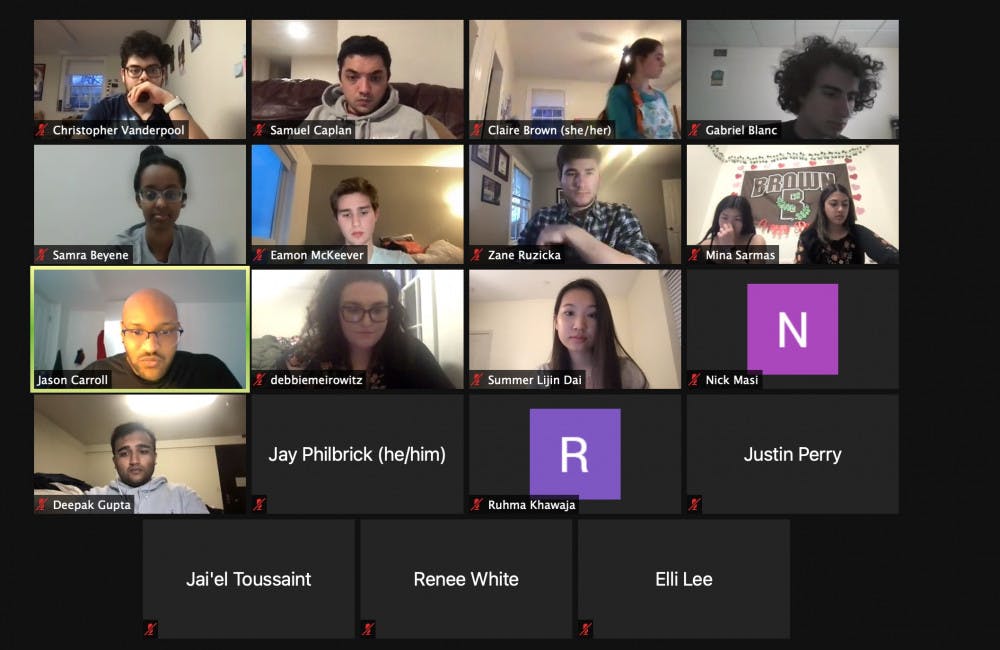The Undergraduate Council of Students proposed a resolution at its general body meeting Wednesday evening calling for the University to implement measures to support student mental health.
A March 24 op-ed in The Herald that condemned the University for failing to prioritize student well-being, as well as an influx of feedback from students struggling with mental health issues, prompted the Council to propose the student mental health resolution, said resolution sponsor Deborah Meirowitz ’22.
Many of the complaints the Council heard stemmed from the University’s shortened spring semester calendar, which does not include a spring break. Unlike Brown, other universities that have canceled spring break due to concerns about students traveling during the COVID-19 pandemic have given their students mental-health days, said Meirowitz.
“We’re, from what I’ve seen, one of the very few schools to both get rid of spring break, not add wellness days (and) not do snow days,” said UCS President Jason Carroll ’21.
The University has the power to improve student wellness by implementing measures such as canceling University exercises and encouraging faculty to modify “assessments to fit the condensed semester,” according to the text of the resolution.
If passed, the resolution would implore the University to take actionable steps to alleviate the current level of academic stress experienced by students. Specific steps recommended in the resolution include encouraging faculty to not teach material during Reading Period that students will be evaluated on, extending the Satisfactory/No Credit grade option deadline and changing assessments to “reflect the reduced semester,” according to the resolution text.
“We urge the University to take action today because students are emotionally exhausted and are struggling to attend to all of their personal, familial and financial needs,” Meirowitz said.
Members of UCS noted that this resolution is particularly important after several University systems have been nonoperational following a March 30 cybersecurity attack. Since the shutdown, students have been unable to order meals on the GET app or access academic department pages, said UCS Chief of Staff Sam Caplan ’22.
Some students have also reported being unable to access the online systems for Counseling and Psychological Services or physical health services, Meirowitz added.
Students have “no access to campus resources but still have access to all the work,” Carroll said.
Also at the meeting, the Council proposed a resolution that compels the University to take a more active role in supporting the Providence community.
This resolution came about after the University leveraged potential donations to the Rhode Island Community Food Bank as incentive for more students to fill out a survey included in a March 22 email to the student body, said resolution sponsor Gabriel Blanc ’23.
The email pledged to donate a base level of $2,500 to RICFB but said that that number would increase to $5,000 if 50 percent of the student body filled out the 2021 Enrolled Student Survey, and would increase to $10,000 if 75 percent of the student body filled out the survey.
Shortly after the email was sent, Dean of the College Rashid Zia and Vice President for Campus Life Eric Estes issued an apology letter for tying community support to student participation in the survey, and committed to donating the full $10,000 regardless of the ultimate survey response rate.
The proposed resolution calls upon the University to take further action beyond its initial apology, Blanc said. Specifically, the resolution would call for the University to apologize directly to RICFB, for greater transparency around how the decision around funding was made and for more University support for community organizations.
Further donations are an action the University can take to build connections with the community, given that it has “clearly demonstrated a willingness and ability to donate,” Blanc said.
The Council also continued its advocacy for the University to identify and provide reparations for the descendants of slaves with historical ties to Brown. As part of this advocacy, Carroll proposed sending an email to the student body that will give them information about the University’s long ties to slavery and inform them about the recent passing of two referenda calling upon the University to provide reparations to identified descendants.
UCS also discussed the Cabinet, the Council’s internal body composed of leadership positions such as parliamentarian and secretary. Currently, the UCS bylaws still refer to such positions as part of the Management Board and do not allow for flexibility in changing internal management positions, said Carroll, who introduced the amendment.
The proposed amendment would formalize the Cabinet and allow for greater flexibility in its composition, which would better support the changing work of UCS and create a more sustainable organization, Carroll said.

ADVERTISEMENT




